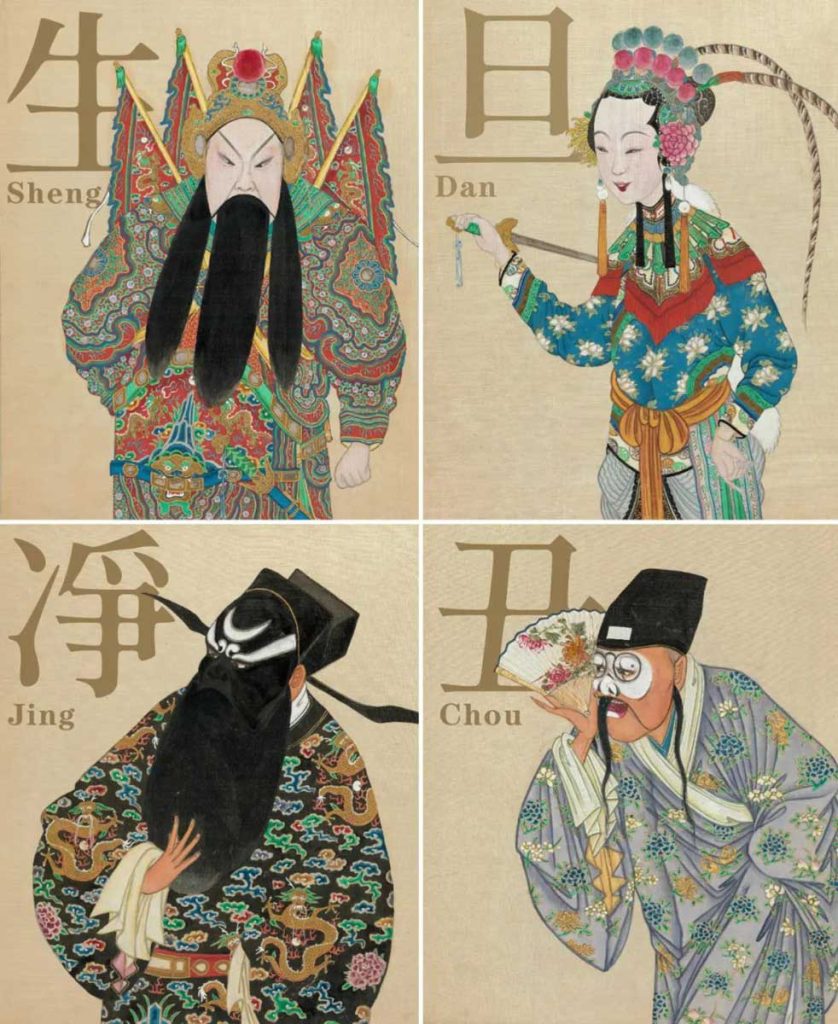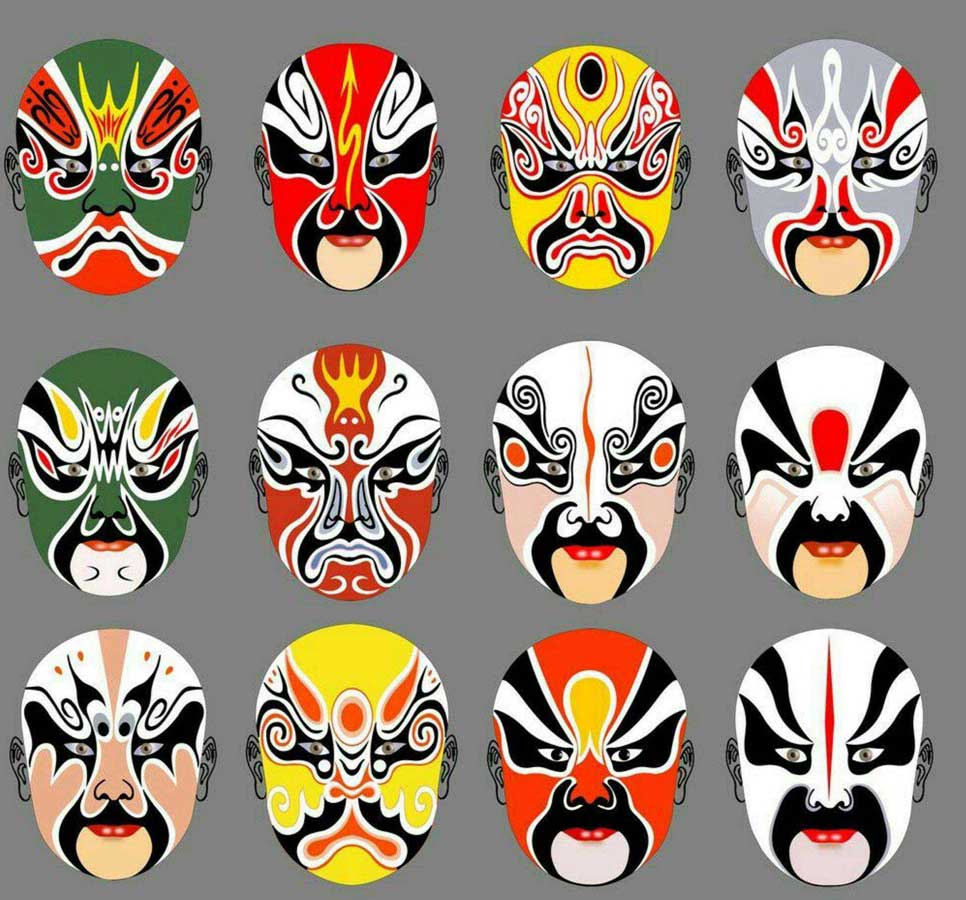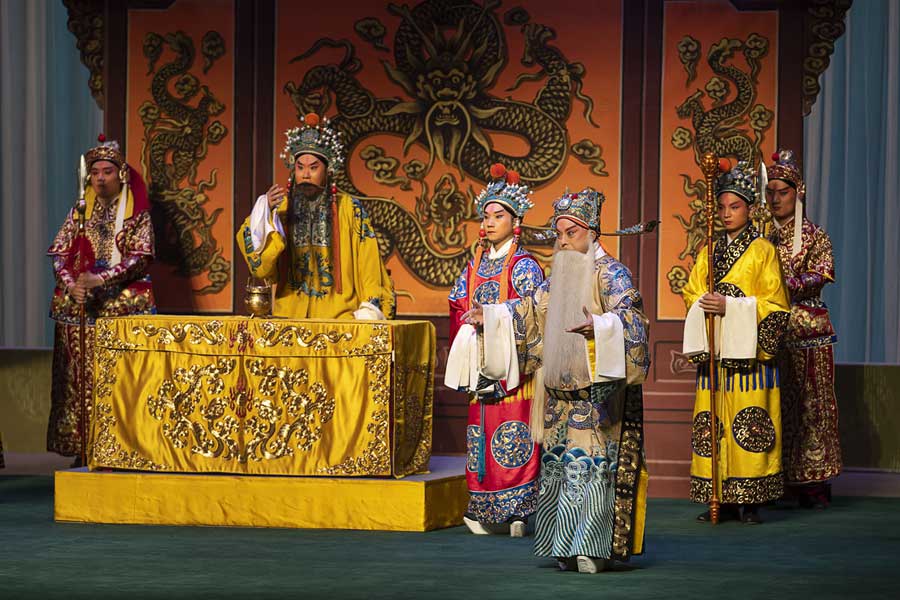Chinese traditional opera is considered one of the world’s three ancient operas, together with Greek tragedy and comedy, and Indian Sanskrit opera. Among the more than 360 ancient local operas in China, Peking Opera or Beijing Opera is known as the Chinese national opera, despite its comparatively young 200-year history. Peking opera is a form of Chinese opera which combines music, vocal performance, mime, dance, and acrobatics to tell stories from Chinese history and folklore. It arose in the late 18th century and became fully developed and recognized by the mid-19th century. The form was extremely popular in the Qing Dynasty court and has come to be regarded as one of the cultural treasures of China.
On November 16, 2010, Peking Opera was included in the List of Representatives of the Intangible Cultural Heritage of Mankind. Major performance troupes are based in Beijing, Tianjin, and Shanghai. The art form is also preserved in Taiwan. It has also spread to other regions such as the United States and Japan.
Origin of Peking Opera
Peking opera was born when the “Four Great Anhui Troupes” brought Anhui opera, or what is now called Huiju徽剧, in 1790 to Beijing, for the eightieth birthday of the Qianlong Emperor. It was originally staged for the court and only made available to the public later.
In 1828, several famous Hubei troupes arrived in Beijing and performed jointly with Anhui troupes. The combination gradually formed Peking opera’s melodies. Although it is called Peking opera (Beijing theater style), its origins are in southern Anhui and eastern Hubei.
Peking opera is generally regarded as having fully formed by 1845. Peking opera’s two main melodies, Xipi西皮 and Erhuang二黄, were derived from Han opera after about 1750. The tune of Peking opera is extremely similar to that of Han opera, therefore Han opera is widely known as the Mother of Peking opera. Xipi as the main melody of Peking opera, literally means “Skin Puppet Show”, referring to the puppet show that originated in Shaanxi province. Some scholars believe that the Xipi musical form was derived from the historic Qinqiang, while many conventions of staging, performance elements, and aesthetic principles were retained from Kunqu昆曲. Thus, Peking opera is not a monolithic form, but rather a coalescence of many older forms.
Four Means of Peking Opera
Singing, recitation, acting, and acrobatic fighting are the four artistic means and the four basic skills of Peking opera.
Peking opera recreates settings and props through the use of mimed gestures and actions. The stage has no real door, carriage, boat, mountain, or horse; hence gestures, footwork, and other movements express the action of opening the door, entering through the door, getting on a carriage, rowing a boat, climbing up a mountain and riding a horse. Each action of the performer is highly symbolic. Feelings and ideas are often expressed through these symbolic motions and the unique format has developed over years of performance.
Classifications of Roles in Peking Opera
The characters of Peking opera are classified according to sex, age, disposition, profession, and social status. There are four major roles in Peking opera in modern times: Sheng生 (male), Dan旦 (female), Jing净 (male with a painted face) and Chou丑 (clown).
| Roles | Definition | Face Design | Major Subtypes |
|---|---|---|---|
| Sheng | Gentlemen | Slight make-up | Laosheng: Middle-aged or elderly men, also referred to as Mo. Xiaosheng: Young men. Wusheng: Men with martial skills. Wawasheng: Children. |
| Dan | Women | Slight make-up | Qingyi: Women with strict moral code. Laodan: Elderly women. Huadan: Young girls. Caidan: Clowns. |
| Jing | Men with distinctive features | Painted | Zhengjing: Primary face-painted role. Fujing: Secondary face-painted role. Wujing: Military face-painted role. |
| Chou | Male clowns | Painted | Wenchou: Civilian clown. Wuchou: Clown with martial skills. |
Sheng are generally positive and can be divided into Laosheng老生 (elderly men), Wusheng武生 (military men), Xiaosheng小生 (young men), and Wawasheng娃娃生 (children). Laosheng are middle-aged or elderly men who are decisive and honest. They are also called Xusheng须生 (beard men), because they wear artificial beards. Wusheng are young generals skilled in martial arts. Xiaosheng are clean-shaven and handsome. The most distinctive feature of the performances by Xiaosheng is the combination of real and falsetto voices in singing and speaking. The falsetto voice is sharp, thin, and high-pitched in order to sound young and to distinguish young men from the elderly. Wawasheng are performed by children.

Dan refers to various female roles, including laodan老旦, qingyi青衣, huadan花旦, wudan武旦 and caidan彩旦. Laodan are elderly women. Laodan performers use their natural voices, which are rich, loud, high-pitched and melodious. Qingyi are generally young or middle-aged women of strong character and fined disposition. Most of them are faithful wives, loving mothers, and pure women from feudal society. Huadan are agile young women with frank and open personalities. They are mostly from humble families or arts, including generals, heroic forest outlaws and fairies. Caidan are clowns in farces and comedies.
Mei Lanfang, Shang Xiaoyun, Cheng Yanqiu, and Xun Huisheng are the famous “Four Great Dan Actors” who made significant contributions to the performance of dan roles and the development of Peking opera.
Jing wears colorful paints on their faces, so they are known as hualian花脸. They can be classified into zhengjing正净 (primary face-painted role), fujing副净 (secondary face-painted role) and wujing武净 (military face-painted role).Zhengjing is also known as dahualian大花脸. A zhengjing performer mainly sings. Most zhengjing are serious, loyal officials and generals who firmly uphold justice. Fujing performers mainly move about, speaking and making postures. Wujing roles involve acrobatic fighting and tumbling with minimal singing and speaking.
Chou are sharp-witted, clever, humorous, honest, and kind men. There are wenchou文丑 (comic civilian role) who speak, and act, and wuchou武丑 (acrobatic-fighting comic role) whose performance involves both speaking and acrobatic fighting.
Facial Makeup of Peking Opera
Facial makeup indicates that colors and lines are used to form various patterns to symbolize the personality and morality of the characters. The function of facial makeup can be summarized into four points: suggesting personality, introducing features, praising virtue or punishing vice and identifying beauty and ugliness.

Basically, facial makeup can be divided into six categories: red, white, black, yellow, blue and green, gold and silver. Red means the character is loyalty, straightness, and bloodiness, such as Guan Yu关羽 in the “Three Kingdoms”. White means the character is treacherous and suspicious, representing murder, such as Cao Cao曹操 in the “Three Kingdoms”. Black means that the character is serious, not frivolous, neutral, and represents wise, such as Bao Zheng包拯 in the “Bao Gong Opera”. Huang means that the character is fierce and insidious, such as Dian Wei典韦. Blue and Green represent the neutral character of rebellious heroes. Gold and silver express mystery, representing the demons and ghosts, such as the Monkey King and White Bones Demon in Journey to the West.
Peking Opera Around the World
In addition to its presence in China, Peking opera has spread to many other places. It also can be found in overseas Chinese communities elsewhere.
Mei Lanfang, one of the most famous Dan performers of all time, was also one of the greatest popularizers of Peking opera abroad. During the 1920s, he performed Peking opera in Japan. This inspired an American tour in February 1930. Although some believed that Peking opera could never be a success in the United States, the favorable reception of Mei and his troupe in New York City disproved this notion. The performances had to be relocated from the 49th Street Theater to the larger National Theater, and the duration of the tour was extended from two weeks to five. Mei traveled across the United States, receiving honorary degrees from the University of California and Pomona College. He followed this tour with a tour of the Soviet Union in 1935.
The theatre department at the University of Hawaii at Manoa has been home to the English language of Peking opera for more than twenty-five years. The school offers Asian Theatre as a major and has regular Peking opera performances, with Lady Mu and the Yang Family Generals being the most regular plays.

